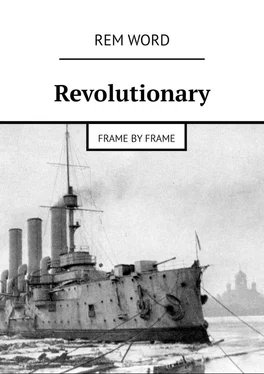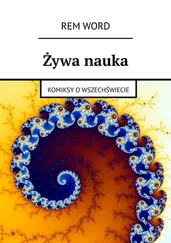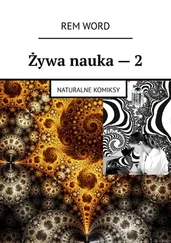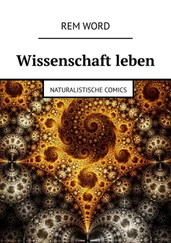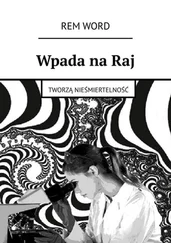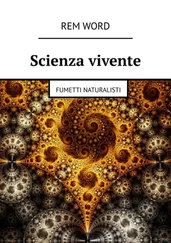Rem Word - Revolutionary. Frame by frame
Здесь есть возможность читать онлайн «Rem Word - Revolutionary. Frame by frame» — ознакомительный отрывок электронной книги совершенно бесплатно, а после прочтения отрывка купить полную версию. В некоторых случаях можно слушать аудио, скачать через торрент в формате fb2 и присутствует краткое содержание. ISBN: , Жанр: Публицистика, История, Политика, Биографии и Мемуары, на английском языке. Описание произведения, (предисловие) а так же отзывы посетителей доступны на портале библиотеки ЛибКат.
- Название:Revolutionary. Frame by frame
- Автор:
- Жанр:
- Год:неизвестен
- ISBN:9785449675361
- Рейтинг книги:4 / 5. Голосов: 1
-
Избранное:Добавить в избранное
- Отзывы:
-
Ваша оценка:
- 80
- 1
- 2
- 3
- 4
- 5
Revolutionary. Frame by frame: краткое содержание, описание и аннотация
Предлагаем к чтению аннотацию, описание, краткое содержание или предисловие (зависит от того, что написал сам автор книги «Revolutionary. Frame by frame»). Если вы не нашли необходимую информацию о книге — напишите в комментариях, мы постараемся отыскать её.
Revolutionary. Frame by frame — читать онлайн ознакомительный отрывок
Ниже представлен текст книги, разбитый по страницам. Система сохранения места последней прочитанной страницы, позволяет с удобством читать онлайн бесплатно книгу «Revolutionary. Frame by frame», без необходимости каждый раз заново искать на чём Вы остановились. Поставьте закладку, и сможете в любой момент перейти на страницу, на которой закончили чтение.
Интервал:
Закладка:

The Russian national bourgeoisie before the October Revolution of 1917 were, in general, quite good, prudent and hard-working people. But the Russian bourgeois are not the vanguard of the revolutionary movement, as in Europe. Some of them are trying to direct the process of social transformations, donating money to terrorists, Social Revolutionaries, Bolsheviks. However, steel is stronger than gold. In such an interaction, the one who holds a revolver or bomb in his hand soon becomes the main one. The offspring of Russian industrialists, merchants do not want to get involved in the intrigues of intrigue. They do not have their own, secret or explicit organization. The purpose of life is to meet a lady from high society, go to a restaurant, organize a chic party, and the like. Photography – bourgeois of Chelyabinsk, 1910

The king, who was fenced off from the people, his closest circle, the family, subconsciously, nonetheless, are looking for some common points with common people. At this time, Grigory Rasputin, a native of Tobolsk Province, the son of a driver and, perhaps, not an ordinary person, travels a lot around Russia, visits Mount Athos and Jerusalem. He arrives in Moscow, where the bishops accept him. They spread a rumor about the abilities of “God man.” The good news reaches the ears of the Empress. At the tea party, November 1, 1905, the first meeting of the emperor and ladies of high society with Rasputin takes place. Further meetings with the entire imperial family are held once a month. Not that the king loved the pilgrim with all his heart, but he is the only one who can calm Alix’s tantrums with his power. Gregory publishes readable works for his time – “The Life of an Experienced Wanderer”, “My Thoughts and Thoughts”. Among the prophecies of 1916, the most important thing is the testament: “… I feel that I must die before the New Year. But I want, nevertheless, to reveal to the Russian people, the Father, Mother Russian and the Children, what they have to do. If I will be killed by simple robbers, by my brothers, Russian peasants, then you, Tsar of Russia, do not be afraid, stay on the throne and rule, and do not fear for your children, for they will reign for another hundred years and beyond. If the nobles kill me, then my blood will remain in their hands, and they will not be able to wash it off for 25 years (until 1941). They will have to leave Russia. Then the brothers will kill the brothers, and kill each other. And 25 years will not be nobles in the state. … If your relatives lead to my death, then no one from your family – neither children nor relatives will survive in two years. They will all be killed by the Russian people …». Photography – Rasputin in the aristocratic circle

In 1912, the Second Balkan War begins. Bulgaria, Greece, Serbia, Montenegro push the Great Porto, strive to pinch off a piece and from each other. The forces of the parties – Turkey 475 thousand people, the Balkan Union – 620 thousand. Battles are fierce. In the course of the first time go combat aircraft; they drop bombs on ships. The Balkans besieged the native Turkish cities, approaching Istanbul, bring turmoil into the souls of the Ottomans, give rise to a political crisis. The losses are 30 thousand people killed on each side. Turkey is losing its possessions in Europe. Serbia never gets access to the sea. Now it is hampered by Albania, which was formed from the “nobody’s” territory, as well as Austria-Hungary, which has entered for this newly formed country. Russia collects donations, provides the Balkan Union of volunteer pilots, makes diplomatic efforts, but, by and large, does not interfere in the conflict. The reason for this – the influence of Grigory Rasputin on the king. Exhortations of the “common man” put off the beginning of the First World War for two years. Photography – Serbian guns in a combat position

Serbia and its surrounding countries in 1913. More recently, on the site of Albania and Macedonia, the possessions of the powerful Ottoman Empire extended. Serbia is freed from the protectorate of Porta, seizes land inhabited by recollected peoples, but, at the insistence of Austria-Hungary, stops at some distance from the coveted Adriatic Sea. This situation is very, very disliked by the Serbs. Radical sentiments are ripening in society. The government cannot and does not seem to want to fight the ubiquitous terrorist organization Black Hand.

Peter L. Bark (1869—1937), ethnic Balt, the last Minister of Finance of the Russian Empire, the initiator of the introduction of the inhuman “Prohibition”. What should he say if it suddenly became possible? It is a pity, he probably will not hear you, now he will turn around and tapping with a cane, podachaet in the restaurant “Maxim”. Since 1920, Peter L. is in perpetual emigration. Next, the ex-minister accepts British citizenship, is awarded the title of knight and baronet. Photography – Peter Bark, Paris, 1915

On July 12, 1914 in the village of Pokrovskoye, Tobolsk Province, the mentally ill Khioniya Guseva stabs Rasputin with a knife. Three years later, this woman will be released from the hospital. In 1919 she would make an attempt on the life of Patriarch Tikhon. Thereafter, her tracks in History are lost. Rasputin is in the Tyumen hospital until August 17, and this time he is unable to reason with the tsar. Its main provisions sound crazy in this world. This is a rejection of foreign Poland and the Baltic states, a withdrawal from the Russian-French-British alliance, a separate peace with the then sane Germany. Somewhat later, on December 16, 1916, Gregory was killed in the Yusupov Palace, from the bullets of Russian nobles and (control shot in the head) by British agent Oswald Rainer. England wants Russia to wage this war. An alternative version – Dmitry Pavlovich (Romanov), cousin of Nicholas II, sends a bullet in the forehead. Empress Alexandra gives the order to arrest the murderers. But, they all possess immunity as the highest nobles, and, after the intervention of the king, “in order not to provoke society,” are released. Photo, from left to right, prince (and, by the way, homosexual) Felix Yusupov, Grand Duke Dmitry Pavlovich, grandson of Alexander II

The queue before the institution “Treasury wine shop.” The photo was taken in 1914, shortly before the disastrous “Prohibition”. The first swallow arrives in the people on July 16 of the same year – a regulatory act, a royal decree on the complete prohibition of the trade in alcohol during the mobilization period. The confirmation follows as the “Highest Commandment (Sovereign Emperor) of August 22, 1914” On the extension of the prohibition of the sale of alcohol, wine and vodka for local consumption in the Empire until the end of wartime”. Consumption of alcohol is reduced from 4.7 liters per capita per year to 0.3 liters. (now 12 l.) Other warring European countries, despite the fact that they drink there no less than in Russia (or even much more, like in France), they don’t even think to introduce anything like that
Читать дальшеИнтервал:
Закладка:
Похожие книги на «Revolutionary. Frame by frame»
Представляем Вашему вниманию похожие книги на «Revolutionary. Frame by frame» списком для выбора. Мы отобрали схожую по названию и смыслу литературу в надежде предоставить читателям больше вариантов отыскать новые, интересные, ещё непрочитанные произведения.
Обсуждение, отзывы о книге «Revolutionary. Frame by frame» и просто собственные мнения читателей. Оставьте ваши комментарии, напишите, что Вы думаете о произведении, его смысле или главных героях. Укажите что конкретно понравилось, а что нет, и почему Вы так считаете.
